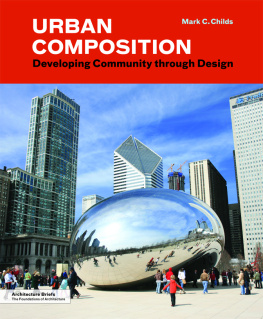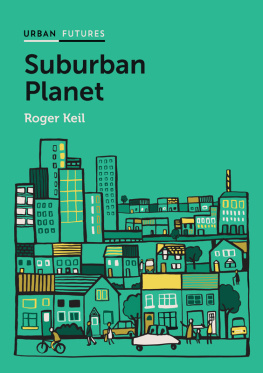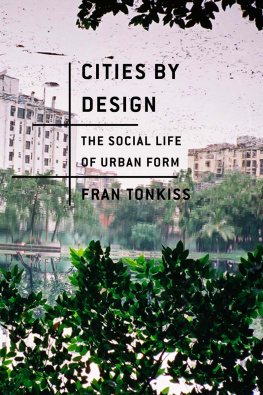To Katrina and Silas. (M.I.B.)
For Caroline, Jillian and Ted. (L.C.M.)
For Danny, Erika, Chris, Jeannine, Evelyn, Gabriel and Susan. (D.J.M.)

Copyright 2015 by SAGE Publications, Inc.
All rights reserved. No part of this book may be reproduced or utilized in any form or by any means, electronic or mechanical, including photocopying, recording, or by any information storage and retrieval system, without permission in writing from the publisher.
Printed in the United States of America
Library of Congress Cataloging-in-Publication Data
Monti, Daniel J.
Urban places and people : the sociology of cities, suburbs, and towns / Daniel J. Monti, Jr., Saint Louis University, Michael Ian Borer, University of Nevada, Las Vegas, Lyn C. Macgregor, University of Wisconsin, Madison.
pages cm
Includes bibliographical references and index.
ISBN 978-1-4129-8742-4 (pbk. : alk. paper)
ISBN 978-1-4833-0990-3 (web pdf)
ISBN 978-1-4833-1533-1 (epub)
1. Sociology, Urban. I. Title.
HT151.M5596 2014
307.76dc23 2013031342
This book is printed on acid-free paper.
14 15 16 17 18 10 9 8 7 6 5 4 3 2 1
FOR INFORMATION:
SAGE Publications, Inc.
2455 Teller Road
Thousand Oaks, California 91320
E-mail:
SAGE Publications Ltd.
1 Olivers Yard
55 City Road
London EC1Y 1SP
United Kingdom
SAGE Publications India Pvt. Ltd.
B 1/I 1 Mohan Cooperative Industrial Area
Mathura Road, New Delhi 110 044
India
SAGE Publications Asia-Pacific Pte. Ltd.
3 Church Street
#10-04 Samsung Hub
Singapore 049483
Acquisitions Editor: Jeff Lasser
Editorial Assistant: Lauren Johnson
Production Editor: Brittany Bauhaus
Copy Editor: Dan Gordon
Typesetter: C&M Digitals (P) Ltd.
Proofreader: Jeff Bryant
Cover Designer: Edgar Abarca
Marketing Manager: Andrew Lee
B RIEF C ONTENTS
D ETAILED C ONTENTS
A CKNOWLEDGMENTS
I t is customary for authors to thank those persons who were instrumental in helping them write their book or assisted them in carrying out the research that went into it. In our case, there are social scientists, historians, reformers, and writers going back at least 200 years upon whose work we relied. There are social philosophers whose writings can be traced back even further in time. But most especially there are the countless millions of men, women, and children from our culture and others who made the stories we tell here and the evidence we assembled here possible to tell and assemble.
To all of them we owe a debt that cannot be repaid other than by having taken their lives and work seriously.
Thank you all.
Dan Monti
Michael Ian Borer
Lyn Macgregor
A BOUT THE A UTHORS
Michael Ian Borer is associate professor of sociology at the University of Nevada, Las Vegas. He holds a BA from Lafayette College, an MA in religious studies from Boston University, and a PhD in sociology, also from Boston University. He is the editor of The Varieties of Urban Experience: The American , Social Psychology Quarterly, and Symbolic Interaction, among others. He served as the 201112 vice president of the Society for the Study of Symbolic Interaction. His research focuses on urbanism, popular culture, the sacred, and collective memory, and he is currently working on a book about the uses and abuses of imagination and nostalgia in American popular culture and the roles they play in the everyday culture of Las Vegas.
Lyn C. Macgregor earned her BA at Boston University and doctorate in sociology at the University of WisconsinMadison. She is the author of Habits of the Heartland: Small Town Life in Modern America (Cornell, 2010). After spending several years on the faculty at the University of Montana, she returned to Madison where she is currently the associate director of the Robert F. and Jean E. Holtz Center for Science & Technology Studies.
Daniel Joseph Monti is professor of sociology and public policy at Saint Louis University. A graduate of Oberlin College and the University of North Carolina and former Woodrow Wilson fellow, he is the author of over 50 scholarly articles and seven books on subjects ranging from educational reform and inner-city redevelopment to youth gangs and American urban history. His most recent book, Engaging Strangers, deals with civic life in contemporary Boston and the role of business in creating a thriving and orderly culture in that city. He currently is working on a pair of edited books dealing, respectively, with the culture of entrepreneurship and civility in urban life and a book detailing the redevelopment of St. Louis. The latter will constitute the longest study of inner-city redevelopment ever undertaken and focus on the role that major institutions and corporations play in fostering the citys economic and civic revival.
I NTRODUCTION Telling the Story of Cities, Suburbs, and Towns |
T his book, as its title indicates, is about urban people and places: how they develop, how they are organized, the problems we associate with them, and the various ways we deal with those problems. It is also a book about the way we talk about these places and people, how we make sense of them, and, ultimately, what the places we build and inhabit tell us about ourselves and the way we live together. We pay some attention to urban places and people in Asia, Africa, Central and South America. In fact, our treatment of cities and urban people on those continents is actually quite detailed for a book not dedicated to . But our discussion of those cities, whatever its strengths and limitations, is intended mostly to help us better understand and appreciate the kinds of cities we know best: those of Western societies and more economically developed countries.
Though pre-urban settlements have been around for at least 10,000 years and have a rich history in most parts of the world, a serious study of cities and urban life didnt begin until the mid-19th century. Thats when urban places of the sort we would recognize as cities emerged full-blown and spread rapidly across the globe, especially in Western societies that were going through a period of intense industrialization. As you will see, the connection between industrialization and city building has been crucial to the way that social scientists and historians think about cities and urban life.
Nonetheless, cities have thrived as a kind of human settlement long before industrialization, despite taking root in very different cultural settings and on very uneven economic playing fields. The largest cities today have populations numbering in the tens of millions. This doesnt mean everyone living or working there is happy, has a decent place to sleep at night, a full stomach, is clothed well, feels safe, and gets along with everyone around them. Depending on where in the world you happen to be, cities are not organized well enough, and maybe cant be organized well enough, under prevailing conditions to enable many of their residents to meet these basic needs. Cities in most parts of the world continue to grow, however, despite these kinds of problems.










